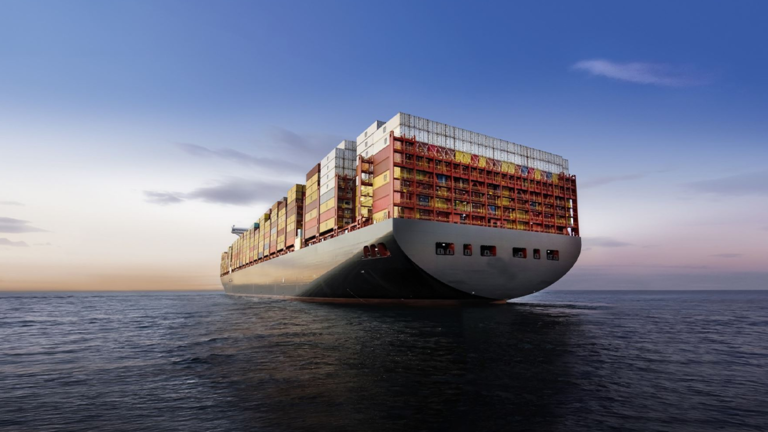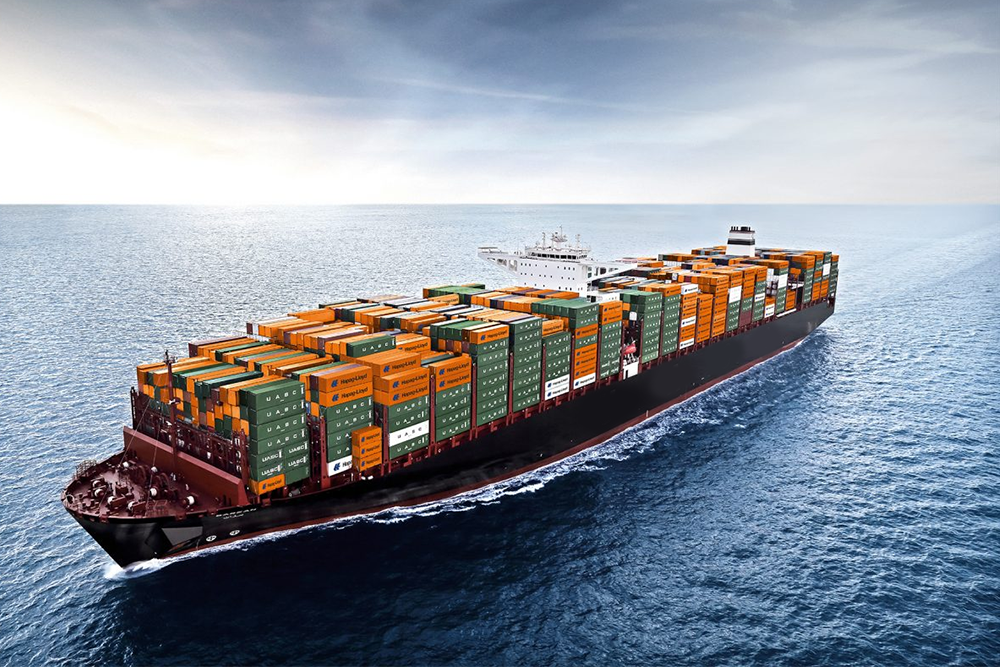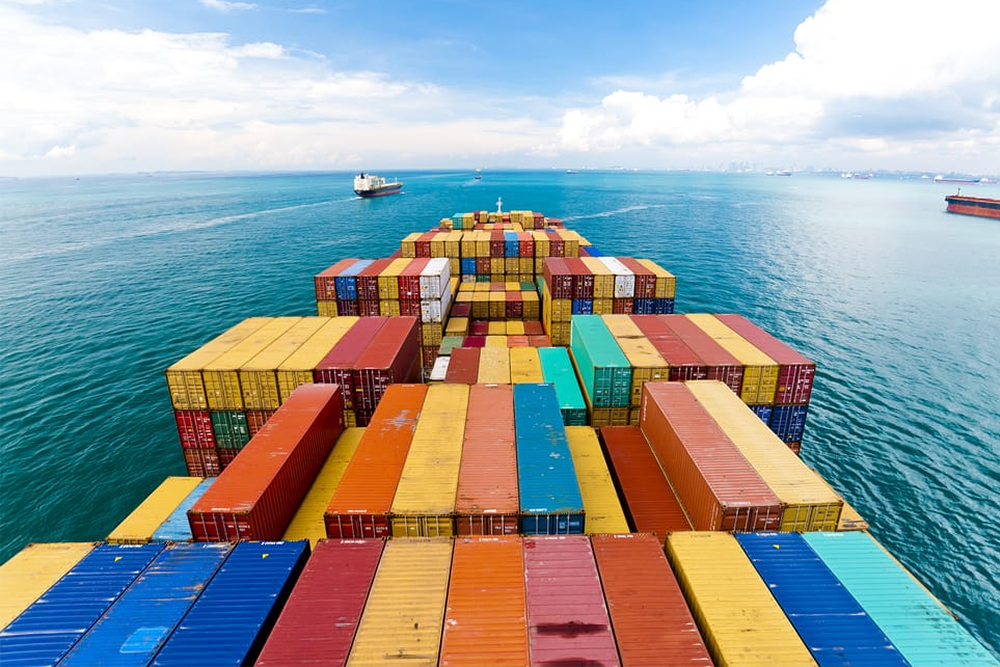
KLT LLC: The Best Sea Freight Company in UAE
Are you trying to find the best sea freight forwarding company in UAE?

If you’re going to send a significant item from one country to another, you’ll almost certainly want the assistance of the best sea freight forwarding company to handle all of the paperwork and procedures. Trust us to handle your valuable goods. Our sea freight services offer safe and secure transport. We provide you quick, effective, and secure sea freight forwarding services. We follow the approach of treating our esteemed clients with the highest respect, commitment, and professionalism. We handle your things with care and safely transport them to your destination. Both full container loads (FCL) and less-than-container loads (LCL) are covered by our sea freight solutions.
In terms of sea freight services, KLT LLC is your best choice because we have long-standing relationships with different shipping companies. As a result, we are able to provide our project forwarding customers with the fastest transit times, customs clearance services, border clearance, and other documents needed for international sea freight project forwarding services. We offer a broad network of freight forwarders with tracking services, a well-established international network, storing facilities for all kinds of cargo, and legal professionals to manage any delays or problems. Contact KLT LLC to learn more about affordable sea freight services in the UAE and to receive a free quote.
The Importance of Sea Freight Forwarding in Dubai
The term “sea freight,” often known as “ocean freight,” refers to the transportation of products by container ship. It is one of the most popular and cost-effective modes of long-distance transportation. Sea freight is frequently used to convey a broad variety of things, including raw materials, manufactured goods, and consumer goods. Sea freight has several benefits, one of which is affordability. Shipping by ocean is typically less costly and more ecologically friendly than shipping by air. Sea freight is a fantastic alternative for carrying large or heavy things since it can handle larger volumes of goods.
Dubai is a perfect source for sea freight shipping since it is a significant centre for global trade and business. As a global trading hub, the UAE has a strong and rapidly expanding economy, and sea freight is an important component of the UAE’s logistics system.
Global Connectivity:
Ports in the city, such as Jebel Ali Port, connect Dubai to the rest of the globe and handle a huge volume of cargo annually. The ports have the most up-to-date infrastructure to manage a variety of goods, including containers, bulk shipments…
Cost-Effectiveness:
Sea freight is one of the most cost-effective methods to move products, making it an appealing alternative for Dubai industries. Especially for large or heavy items, shipping by ocean is typically less expensive than shipping by air. Due to its affordability and Dubai’s extensive worldwide connections, sea freight is a key component of its logistics system.
Trade & Sales:
Dubai’s economy is primarily based on trade and business, and sea freight is a key component of this. A large number of items are imported and exported through the city’s ports, which handle a diverse variety of goods. Businesses can ship goods to and from Dubai effectively and economically with the help of sea freight, boosting the local economy and supporting global commerce.
Diversification:
Dubai has recently diversified its economy into new fields, including tourism, real estate, and logistics. The city’s economy has historically relied mainly on the production of oil and gas. A significant component of this diversification is sea freight, which enables the city to increase its trade and commerce outside of the conventional oil and gas industry.
Support from the government:
The Dubai government has made significant investments in the city’s ports and logistics infrastructure because the UAE understands the value of sea freight. With the assistance of the government, Dubai has become a significant player in the world’s sea freight sector and a centre for international trade.
Dubai’s economy depends heavily on sea freight since it links the city to the rest of the globe and supports trade and business there. Sea freight is becoming a crucial component of the city’s logistics system because of its affordability, accessibility to the rest of the world, and government assistance. Sea freight will become more crucial to the growth and development of Dubai as it seeks to diversify its economy and increase trade and commerce.
The Purpose of Sea Freight Forwarding Companies in the UAE
Sea freight forwarding companies play an important part in the UAE’s logistics and supply chain industries. These companies specialise in planning and managing the transportation of products by sea freight, and they are in charge of everything from arranging the cargo to providing customs clearance and delivery to the ultimate destination.
Shipping Arrangements and Coordination:
This encompasses anything from reserving cargo space on a ship to arranging for product loading and unloading at ports. They also manage the paperwork and documentation needed for international transportation, such as bills of lading and customs clearance procedures.
Providing Logistics Services:
They collaborate extensively with their clients to understand their unique requirements and build a shipping strategy that fits those requirements. This might entail coordinating multiple means of transportation, such as combining sea and air freight, to guarantee that items arrive on time and on budget.
Managing Risk:
Risks associated with shipping products by sea freight include cargo damage or loss. Sea freight forwarding businesses are responsible for controlling these risks and ensuring the safety of their clients’ products throughout the route. They also offer insurance to defend against such losses.
Customs clearance and delivery:
Sea freight forwarding companies are in charge of customs clearance for their clients’ products. This includes compiling and submitting the required papers, as well as collaborating with customs officers to ensure that items are passed swiftly and effectively. The forwarding company will arrange for delivery to the ultimate destination after the items have been cleared.
Cost-Effectiveness:
Sea freight forwarding companies may assist businesses in lowering expenses by negotiating prices with shipping lines and delivering cost-effective logistics solutions. They also provide value-added services such as storage, packing, and even financing alternatives to ensure that their clients’ items are delivered on time and under budget.
Sea freight forwarding companies play an important part in the UAE’s logistics and supply chain sectors. They are in charge of planning and managing the shipment of products via sea freight, as well as providing logistical solutions, risk management, customs clearance and delivery, and cost-effectiveness. Sea freight forwarding companies assist businesses in transporting products quickly and cost-effectively by working closely with their clients and knowing their individual demands.
Understanding Sea Freight Forwarding Systems
The logistics activities involved in sea freight forwarding must be coordinated to guarantee that goods are carried quickly, safely, and inexpensively. The process of sea freight forwarding begins when a customer contacts a sea freight forwarder to arrange for the shipping of their goods. The forwarder then acts as a point of interaction between the client and the shipping company, coordinating the entire cargo from beginning to end. The first step in the sea freight forwarding process is to determine the appropriate shipping route and schedule for the goods’ transportation.
The first step in the sea freight forwarding process is to determine the appropriate shipping route and schedule for the goods’ transportation. Consider factors such as freight costs, journey periods, and ship availability for effective transportation. After the shipping route and schedule have been determined, the forwarder will arrange for the goods to be picked up from the customer’s location and transported to the port of origin.

At the port of origin, the forwarder will handle the necessary documentation, such as the bill of lading and customs clearance. Additionally, they will arrange for the goods to be loaded onto the ship and ensure that they are safely attached for transportation.
The forwarder will track the shipment’s development throughout transit and update the client on its progress. The forwarder will handle the required paperwork and make arrangements for the items to be passed through customs once the ship arrives at its destination port. Additionally, they will make arrangements for the delivery of the products to the customer’s location.
Overall, the sea freight forwarding process is designed to ensure that goods are delivered quickly and efficiently, as well as to support cost-cutting initiatives and increase supply chain effectiveness. The ocean freight forwarder acts as the client’s only point of contact, overseeing all aspects of the cargo from start to finish and providing a comprehensive service.
Scheduling and Reservations:
One of the most important components of a sea freight forwarding system is the booking and scheduling module. Forwarders can use this part to reserve cargo space on a ship, track its whereabouts, and schedule the loading and unloading of goods at ports. This module gives the forwarder access to real-time data on the ship’s position and estimated arrival time, allowing them to make arrangements for delivery and customs clearance.
Management of compliance and documents:
Compliance and documentation management systems are also part of sea freight forwarding systems. This helps make sure that the necessary paperwork, including bills of lading and customs clearance paperwork, is completed, submitted, and complies with all relevant international shipping rules. Additionally, this module enables forwarders to keep track of and manage document status, including whether customs officials have accepted or rejected them.
Tracking and traceability:
A sea freight forwarding system’s tracking and traceability module is an essential component. The use of this module by forwarders allows them to follow the route taken by products from their point of origin to their destination. Real-time location updates include whether the products have been loaded onto a ship or are awaiting customs clearance. This makes it possible for forwarders to handle any issues that could arise during transit quickly and effectively.
CRM (Customer Relationship Management)
Systems for sea freight forwarding also include a CRM element that helps forwarders manage their client relationships. This helps track communication and billing while also keeping track of client information and history. Forwarders may improve their relationships with their clients and provide top-notch customer service by utilising this module.
Monitoring and Analysis:
The sea freight forwarding systems’ monitoring and analytics module comes last. Forwarders can thus generate data on a range of shipping-related subjects, such as cargo volume, profits, and delivery schedules. Additionally, this module gives forwarders knowledge on how their business is run and helps them identify areas for improvement.
Goods shipping through water must be organised with the use of systems for sea freight forwarding. These systems are used by sea freight forwarding companies to efficiently manage every step of the shipping process, from booking cargo space to organising customs clearance and delivery.
Knowing the many components of a sea freight forwarding system allows businesses to ensure efficient shipment, track and trace the movement of items, and ensure efficient delivery.
Why Choose KLT as Your Best Sea Freight Forwarder?
Our Shipping Methods
FCL (Full Container Load):
When adopting the FCL (full container load) shipping method, one shipper’s items are transported in an entire container. This method is widely used for large product shipments since it grants the shipper exclusive use of the container. You can avoid having your cargo mixed with that of other shippers. Using FCL shipping has a number of advantages. First of all, the shipper has more control over the shipping process since they have exclusive use of the container and may arrange for their goods to be packed and loaded in a certain manner. FCL shipping may also be less expensive than LCL (Less Than Container Load) shipping since the shipper does not divide the cost of the container with other shippers. One of the main negatives is that a lot of things must be transported because the shipper needs to fill the entire container. Additionally, FCL shipping could be more expensive than LCL shipping if the shipper does not have enough goods to fill a container. Businesses sending vast quantities of goods should consider using FCL shipping since it gives them more control over the shipping process and can be more affordable than LCL shipping. However, it is very important to consider the volume of items and the cost before deciding on the shipping method.
Less than container load (LCL):
Several shippers can consolidate their goods into a single container using the LCL (less-than-container-load) shipping method. It allows you to split the container’s cost. This approach is popular for smaller shipments of products since it enables one to only pay for the container capacity that is actually used. It is more cost-effective for shippers who do not have enough items to fill a whole container. LCL shipping is also more flexible because shippers can choose to send fewer goods. As a result, managing inventory and meeting customer demand is simplified for companies. The fact that shippers do not have exclusive use of the container and that their goods could be combined with those of other shippers is one of the key negatives. LCL shipments may also be less secure due to the shipper’s failure to wrap and safeguard the goods. LCL shipping is an excellent option for businesses that need to ship smaller quantities of goods and want to share the expense of the container. Businesses must consider security and the possibility that their products may be mixed with others before choosing between LCL and FCL shipping.
Bulk Shipping:
Bulk shipping is a technique for moving massive amounts of unpackaged, loose products, including grains, coal, ore, and liquids like oil and gas. Bulk carriers, special ships specialised for carrying bulk cargo, are used to carry these products. Bulk shipping may be a cost-effective option for companies that need to transport large quantities of completed goods or raw materials. Given that there is less handling and labour required because the commodities are not packaged, shipping in bulk may be less expensive. Additionally, because of their enormous cargo capacity, bulk carriers can transport a lot of material on a single route. However, it’s important for businesses to consider the risks of damage or loss as well as the lack of protection before choosing this shipping option.
How to Choose the Best Sea Freight Company in UAE for Your Business
Selecting the best sea product forwarding company in the UAE for your business might be difficult since there are so many things to consider before choosing the freight forwarding company.
Service offerings: The scope of services provided by the sea freight firm should be taken into account as the first factor. A firm that provides a wide range of services, such as freight forwarding, customs clearance, warehousing, and logistics management, is what you should be looking for. As a result, you’ll be able to rely on just one business for all of your sea freight requirements.
Network and coverage: It’s essential to pick a sea freight provider with a wide network and coverage throughout the UAE and the locations you are exporting to. This will guarantee that your items will be carried effectively and with the fewest possible delays.
Experience and reputation: Be sure to choose a sea freight company with a solid reputation and a successful track record. Choose a company with experience in your sector since they will be better able to handle the unique requirements of your organisation.
Choosing a sea freight service requires taking price into account, of course. But it’s important to keep in mind that occasionally the cheapest option isn’t the best. Look for a company that charges fair fees and is upfront and open about its expenses.
Customer service and communication: When it comes to sea freight, effective customer service and communication are important. Select a firm that will keep you informed at every step of the shipping process, is responsive, and is simple to get a hold of.
Security: Your cargo’s safety and security are of the highest concern. Select a company that follows strict security and safety procedures and is adequately insured to safeguard your goods in the event of an accident or damage.
By taking these elements into account, you can be sure that you have selected a sea freight company in the UAE that is suitable for your company’s needs and that will provide you with the quality of service you demand.

